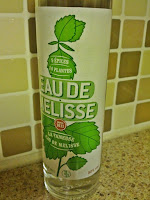MELISSA OFFICINALIS
Paraphrasing the title of a well-known bestseller from about ten years ago, today I would like to talk about Melissa officinalis also known as lemon grass, cedronella or limunin ...
Melissa is a plant that grows spontaneously in our latitudes and can easily be found in some gardens during spring and summer. It is easily recognized by the shape of the long petiolate oval-elliptic leaves which have roughness at the edges. By sharpening your sense of smell, you can identify it by the discreet lemon aroma it gives off... then try rubbing the leaves and you will immediately distinguish it!
The use of lemon balm dates back to ancient times as documented by Avicenna (Persian doctor and philosopher) around the year 1000 AD He says: " ...lemon balm wine is effective against syncope or agony because it greatly comforts the core. " This quote indicates how lemon balm was used for its relaxing and mildly sedative, properties that have also been confirmed by scientific research.
The active ingredients contained in this plant include polyphenols ( caffeic, rosmarinic, p-coumaric acid ) and essential oil (consisting of aldehydes mainly). The latter is able to interact with the receptors of the GABAergic system in order to promote the relaxing effect on the muscles.
Melissa is also used for its carminative properties in cases of abdominal swelling, especially those of psychosomatic origin.
Melissa is a plant that grows spontaneously in our latitudes and can easily be found in some gardens during spring and summer. It is easily recognized by the shape of the long petiolate oval-elliptic leaves which have roughness at the edges. By sharpening your sense of smell, you can identify it by the discreet lemon aroma it gives off... then try rubbing the leaves and you will immediately distinguish it!
 |
| Melissa officinalis |
The active ingredients contained in this plant include polyphenols ( caffeic, rosmarinic, p-coumaric acid ) and essential oil (consisting of aldehydes mainly). The latter is able to interact with the receptors of the GABAergic system in order to promote the relaxing effect on the muscles.
Melissa is also used for its carminative properties in cases of abdominal swelling, especially those of psychosomatic origin.

|
| Eau de melisse |
One of the best-known recipes based on this plant is Lemon Balm Water ( Eau de melisse ), a formula introduced in the 17th century by the Discalced Carmelites which, still today, is on the market for its digestive, carminative and relaxing properties.
